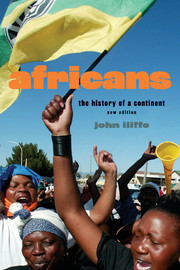Book contents
- Frontmatter
- Contents
- List of maps
- Preface to the second edition
- Africans
- 1 The frontiersmen of mankind
- 2 The emergence of food-producing communities
- 3 The impact of metals
- 4 Christianity and Islam
- 5 Colonising society in western Africa
- 6 Colonising society in eastern and southern Africa
- 7 The Atlantic slave trade
- 8 Regional diversity in the nineteenth century
- 9 Colonial invasion
- 10 Colonial change, 1918–1950
- 11 Independent Africa, 1950–1980
- 12 Industrialisation and race in South Africa, 1886–1994
- 13 In the time of AIDS
- Notes
- Further reading
- Index
- Books in the series
4 - Christianity and Islam
- Frontmatter
- Contents
- List of maps
- Preface to the second edition
- Africans
- 1 The frontiersmen of mankind
- 2 The emergence of food-producing communities
- 3 The impact of metals
- 4 Christianity and Islam
- 5 Colonising society in western Africa
- 6 Colonising society in eastern and southern Africa
- 7 The Atlantic slave trade
- 8 Regional diversity in the nineteenth century
- 9 Colonial invasion
- 10 Colonial change, 1918–1950
- 11 Independent Africa, 1950–1980
- 12 Industrialisation and race in South Africa, 1886–1994
- 13 In the time of AIDS
- Notes
- Further reading
- Index
- Books in the series
Summary
while bantu-speaking peoples were colonising southern africa, the north was entering one of its greatest historical periods. Perhaps only in pharaonic times had it been more central to human progress than in the third and fourth centuries ad, when it was the intellectual spearhead of Christianity, and again 800 years later, when it was the pivot of Islam and a commercial network encompassing most of the Old World. This leadership, already threatened, was destroyed during the fourteenth century by the demographic catastrophe of the Black Death, from which the region took 500 years to recover. But in their time of greatness, North Africans adapted Christianity and Islam to their own cultures and transmitted both religions to Black Africa, where centuries of internal development had prepared social environments for their reception and further adaptation.
CHRISTIANITY IN NORTH AFRICA
Legend said that St Mark himself brought Christianity to Alexandria in ad 61. In reality the church in Jerusalem probably sent missionaries to Alexandria's large Jewish community. The first firm evidence of Christianity there comes from an early second-century controversy between Jews who had and those who had not accepted the new faith. Shortly afterwards Christianity expanded beyond this Jewish nucleus. By ad 200 there was a Greek-speaking church under a Bishop of Alexandria, with many Christians in Upper as well as Lower Egypt.
- Type
- Chapter
- Information
- AfricansThe History of a Continent, pp. 37 - 62Publisher: Cambridge University PressPrint publication year: 2007

